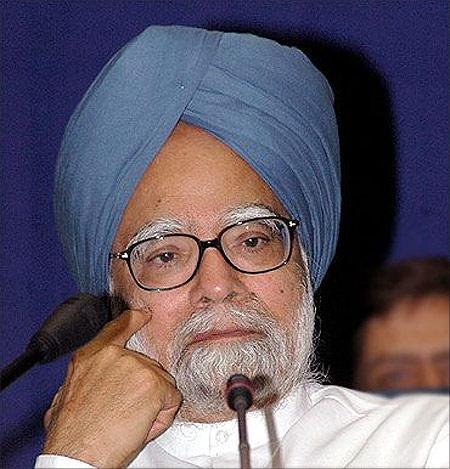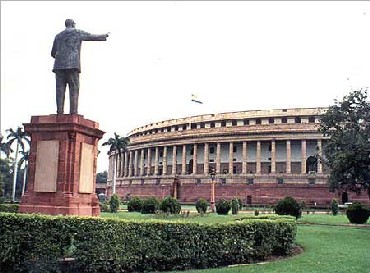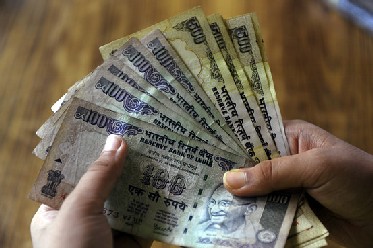Photographs: Reuters
Holding that 'high' fiscal deficit is a deterrent for domestic and foreign investments, Prime Minister Manmohan Singh said on Thursday the government will have to overcome constraints to achieve a target of nearly $1 trillion of investment in infrastructure sectors.
Conscious of the fact that the government was working 'against the political calendar', he called for a common understanding to work out mechanisms and remedial measures to tackle these 'critical deficiencies on a priority basis'.
Fuel supply arrangements, security and environmental clearances and financing difficulties were among the 'constraints' in achieving a 12th Plan infrastructure investment target, he said.
. . .
PM on why high fiscal deficit is a deterrent
Photographs: Reuters
The Prime Minister was making his opening remarks at the first meeting of the reconstituted Council of Ministers in New Delhi to share with them 'a few thoughts' on the agenda of the government.
"My own view is that while we need not be unduly gloomy about our prospects, we certainly need to redouble our resolve to meet the challenges before us and rise to the task of governance," he said.
He recalled the achievements of United Progressive Alliance government in the last nine years in social and economic policy making, including flagship schemes like MNREGA and Aadhar number, combined with robust economic growth had helped enhanced social sector spending.
. . .
PM on why high fiscal deficit is a deterrent
"While we should take justifiable pride in our successes, it is important to recognise that we are now also experiencing the fallout of difficult economic conditions worldwide.
"As a result, our growth has decelerated, our exports have fallen and our fiscal deficits are expanding.
"Of particular concern is the fiscal deficit, which is too high and acts as a deterrent for domestic and foreign investment," he said.
The Prime Minister said these issues have a rippling effect across the economy and on the work of many departments that are represented here.
. . .
PM on why high fiscal deficit is a deterrent
Image: Indian Parliament.Photographs: Reuters
"One area that is at the top of our agenda and will require particular attention and effort at multiple levels across government is infrastructure.
During the Twelfth Plan, we have set ourselves a target of realizing nearly 1 trillion dollars of investment in infrastructure sectors.
"To do so, we will have to overcome the constraints that currently deter or slow down this investment.
"Fuel supply arrangements, security and environmental clearances and financing difficulties are among these constraints. The growing gap between demand and supply of energy has emerged as a major constraint on our development," he said.
. . .
PM on why high fiscal deficit is a deterrent
Photographs: Reuters
Singh said this was a major factor in widening the deficit on current account of our balance of payments as well as the fiscal deficit.
"It is imperative that we come to a common understanding on these issues and work out mechanisms and remedial measures that will enable us to tackle these critical deficiences on a priority basis," he said.
He said the country can achieve the targets that have set for ourselves, provided we approach the task with courage and with conviction.
. . .
PM on why high fiscal deficit is a deterrent
Photographs: Reuters
"I am aware that we are working against the political calendar, but we should not lose sight of the fact that we are also involved in the task of nation-building.
"Our responsibilities and our commitment therefore need to transcend other considerations," he said.
He said he has no doubt that, in the time that is available to the government, each one of them will bring the best efforts to complete the unfinished task.
Asking senior colleagues to allocate work for junior ministers, Singh said a number of 'energetic and younger' people have now joined the Council of Ministers.
"I would also request my senior Cabinet colleagues to make full use of the capacities and capabilities of their ministers of State by assigning them substantive tasks," he said.







article